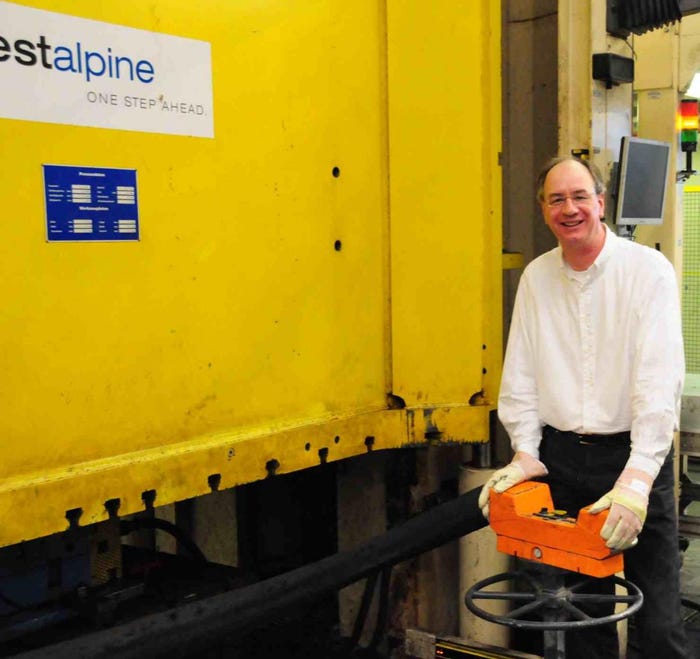Renewable Remarks: TULiPPS flourishing as plastics simplify solar module assembly
Earlier this year PlasticsToday brought you news from TULiPPS Solar (Eindhoven, The Netherlands) about the company's success developing new flame retardant thermoplastic automotive-grade composite materials for use with solar panels.
October 24, 2011
Earlier this year PlasticsToday brought you news from TULiPPS Solar (Eindhoven, The Netherlands) about the company's success developing new flame retardant thermoplastic automotive-grade composite materials for use with solar panels. The company recently announced a new product using this technology that will be commercially available next year: a 500 Watt-peak (Wp) lightweight PV module that has the largest-capacity in the solar industry.
|
TULiPPS' director Paul Stassen stands near one of his company's presses. |
Due to its thin, strong solar glass on the front, a thin glass PV laminate on a composite module base on the back, and a frameless solar panel support system using lightweight long-fiber thermoplastic (LFT) polypropylene (PP) composite, the 500 Watt panel has the thinnest stack and lightest installed weight in the industry. 

The120-cell modules have the same height and weight as a standard 280Watt panel with 72 cells and an aluminum frame, despite being 60% wider.
The innovation concerns not only the panels. Using flame retardant LFT-PP roof mounts makes it possible to use these massive (but light) modules in different ways because of what is missing - the aluminum frame.
Composite plastics enable favorable mounting
Without aluminum frames, panels can be manufactured much more easily in different shapes, allowing them to more completely fill the space available and be used in more places. 

TULiPPS' roof anchors mount the solar modules at a shallower angle of 5 degrees. Despite losing some efficiency at this angle, these new mounts and larger panels make it possible to lower the total installed cost of ownership of pv systems. Now, covering a larger area with fewer higher-wattage panels can be more cost effective compared to filling a space with a greater number of smaller (lower wattage) modules mounted at higher-efficiency angles. 

There are several other reasons that molded composite support structures are important for the industry:
Better mounting options - roof membranes are not penetrated by TULiPPS roof anchoring system, which can be used with both silicon and thin film solar technologies and works on flat roofs, pitched roofs, or with building-integrated photovoltaics.
Frameless modules are easier to clean; dust, debris, and dirt can run off module edges and not be trapped.
Fewer parts are required, lowering weight, cost, installation time and complexity. Also, the non-conductive polymer support structure does not require electrical grounding.
ECO-compliant halogen-free flame retardant composites are recyclable, an attractive option at the product's end of life.
Wide adoption possible
TULiPPS believes that it is easy to implement its mounting structures and designs in all existing PV module factories. The strong, durable composite materials process easily, and have been fabricated on commercial scale with inline compounding and molding equipment. 

 Accelerated aging tests have shown that physical and mechanical properties are retained over time, and new colorants for these materials that increase the range of colors from the two typically offered in the automotive industry (black and natural) have shown long-term weatherability and UV stability, so 25-year solar module warranties can be offered.
TULiPPS new product and mounting approach is good news for the plastics industry, not only because it makes more use of composite materials than the standard PV modules, but because the flexibility it gives and the cost reductions it could lead to should drive demand higher as well.
About the Author: Debbie Sniderman writes, owns, and consults with VI Ventures, an R&D and manufacturing consulting company for renewable energy products and technologies. She can be contacted at [email protected].
About the Author(s)
You May Also Like



